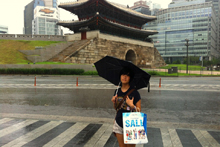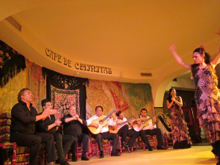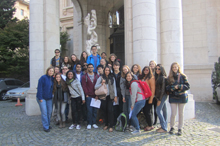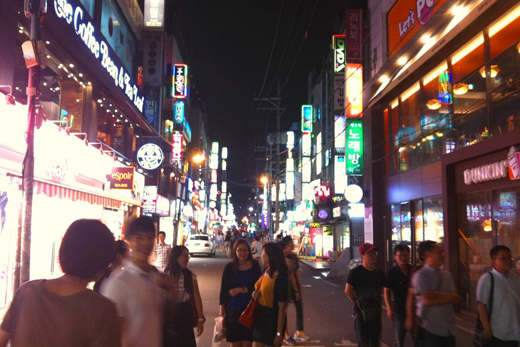Many Emory students broadened their viewpoints and experience with study abroad programs this summer, taking in the cultural, academic and political aspects of the countries they visited.
Here is a sampling of some of their adventures:

Junior Brigid Choi explores Seoul on the Emory Korean Studies Program. Photo courtesy of Brigid Choi.
Emory junior Brigid Choi took advantage of the Emory Korean Studies Program, noting on the Center for International Programs Abroad (CIPA) blog, "Six weeks is short. The key is to make good use of it and learn as much as you can about Korean culture." Choi notes that the program does this by "bringing us to temples, palaces, fortresses, museums, tourist spots, and even the 38th Parallel." Studying at the Yonsei International Summer School program, she says she would not have gained her new perspective on the Korean culture if she hadn’t studied abroad in Seoul. For example, she writes, "Art isn’t viewed as something too stressful, so it becomes fun and free. In [the Seoul neighborhood of] Insadong, independent artists open their private galleries strictly for viewing, not for selling. . . Not only have I gained a closer look into my parents’ background, but also I have gained the proper language tools to communicate more effectively with them … in the language of their home."

A Flamenco show in Madrid. Photo courtesy of Kelley McIntire
A 30-member group was on the Emory European Politics program, spending four weeks in Berlin, and the last two traveling around Europe to Brussels, the Hague, Geneva and Madrid. Emory senior Kelley McIntire writes on the CIPA blog, "Berlin is modern, historic, international and vibrant, all in one." Two places stood out to her: The Holocaust Memorial and the Brandenburg Gate. She also enjoyed the pastoral, spectacular scenery of Switzerland from a gondola ride up a mountain overlooking Geneva and gained a newfound admiration for Spanish culture, describing the performance of a Flamenco dance at a restaurant: "Flamenco only reflects and expresses what already lives among society – its passions, its exuberance, its life."
Emory College junior Hannah Smagh joined other students on the Greek island of Samothrace on a project for the reconstruction of the Winged Victory of Samothrace. "The statue itself is in the Louvre in Paris but we have many fragments on the island that were discovered after the statue left the island," says Smagh. She worked with art history professor Bonna Wescoat. The team, led by Wescoat, has partnered with the Louvre to expand the knowledge of the headless statue. "This summer I worked with a couple scholars from the Louvre on the fragments, this time by handling the actual fragments," Smagh says. "The work was immensely rewarding and we were able to place a couple of the fragments with great confidence." The group also researched the material of the building that enclosed the statue, as well as pottery fragments and wall plaster fragments.

Emory group in Argentina. Photo courtesy of Hernan Feldman.
Hernán Feldman and Jennifer Feldman, professors in the Department of Spanish and Portuguese, led the Latin American Cultural Studies Summer Program, with 25 students studying at the Instituto de Desarrollo Económico y Social in Buenos Aires, Argentina. The program included students from intermediate and advanced levels, taking courses dealing with language and culture, cultural history of the city and Argentine politics. Hands-on cultural activities were led by Spanish graduate students across the city, then shared in the classroom. Field trips included a historically oriented city tour, a visit to a ranch in the countryside, a tour to the Tigre Delta with a focus on environmental issues, and a boat trip to Uruguay centered on Río de la Plata culture.
Five weeks in France, specifically Paris, Versailles, the Loire and Champagne regions, meant intensive immersion in French language, culture, history, art and literature for two senior lecturers in French, Lilia Coropceanu and Catherine Dana, and 14 students in the Emory in France Summer Program. They learned about the winemaking process, saw plays at the legendary Comédie Française, and attended the Opéra Garnier. "For French teachers like us, who spend hours talking about French history, literature [and] culture, this program offers the beautiful opportunity to discover France anew — through the amazed eyes of American students," says Dana.
Comparing and contrasting local cultures to those of the United States, 43 students in the Iberian Studies Summer Program used this ethnographic approach during their stays in Seville and Salamanca. Donald Tuten, Robyn Clarke and José Luis Boigues, professors in the Department of Spanish and Portuguese, led the program, where students studied at the local Emory center and the historic University of Salamanca to participate in, observe, discuss and reflect upon aspects of local cultures. The program included students at all levels, from those aiming to develop basic communicative and cultural competence in Spanish to advanced-level students who took seminars on language and identity, visual culture and reading the media. According to Tuten, a select group of advanced students also took research trips to the different bilingual regions of Spain and subsequently taught classes for fellow students in which they discussed their findings.

